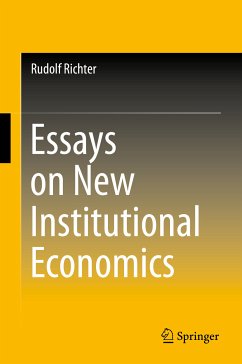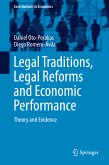Rudolf Richter
Essays on New Institutional Economics (eBook, PDF)
73,95 €
73,95 €
inkl. MwSt.
Sofort per Download lieferbar

37 °P sammeln
73,95 €
Als Download kaufen

73,95 €
inkl. MwSt.
Sofort per Download lieferbar

37 °P sammeln
Jetzt verschenken
Alle Infos zum eBook verschenken
73,95 €
inkl. MwSt.
Sofort per Download lieferbar
Alle Infos zum eBook verschenken

37 °P sammeln
Rudolf Richter
Essays on New Institutional Economics (eBook, PDF)
- Format: PDF
- Merkliste
- Auf die Merkliste
- Bewerten Bewerten
- Teilen
- Produkt teilen
- Produkterinnerung
- Produkterinnerung

Bitte loggen Sie sich zunächst in Ihr Kundenkonto ein oder registrieren Sie sich bei
bücher.de, um das eBook-Abo tolino select nutzen zu können.
Hier können Sie sich einloggen
Hier können Sie sich einloggen
Sie sind bereits eingeloggt. Klicken Sie auf 2. tolino select Abo, um fortzufahren.

Bitte loggen Sie sich zunächst in Ihr Kundenkonto ein oder registrieren Sie sich bei bücher.de, um das eBook-Abo tolino select nutzen zu können.
This collection of essays comprises some of Rudolf Richter's important contributions to research on New Institutional Economics (NIE). It deals with the central idea, principles, and methodology of New Institutional Economics and explores its relation to sociology and law. Other chapters examine applications of NIE to various microeconomic and macroeconomic issues in the face of uncertainty, from entrepreneurship to the euro crisis.
- Geräte: PC
- ohne Kopierschutz
- eBook Hilfe
- Größe: 2.41MB
Andere Kunden interessierten sich auch für
![Legal Traditions, Legal Reforms and Economic Performance (eBook, PDF) Legal Traditions, Legal Reforms and Economic Performance (eBook, PDF)]() Daniel Oto-PeralíasLegal Traditions, Legal Reforms and Economic Performance (eBook, PDF)81,95 €
Daniel Oto-PeralíasLegal Traditions, Legal Reforms and Economic Performance (eBook, PDF)81,95 €![Philosophy of Law (eBook, PDF) Philosophy of Law (eBook, PDF)]() Walter E. BlockPhilosophy of Law (eBook, PDF)57,95 €
Walter E. BlockPhilosophy of Law (eBook, PDF)57,95 €- -23%11
![Angewandte Mikroökonomie und Wirtschaftspolitik (eBook, PDF) Angewandte Mikroökonomie und Wirtschaftspolitik (eBook, PDF)]() Marc ScheufenAngewandte Mikroökonomie und Wirtschaftspolitik (eBook, PDF)26,99 €
Marc ScheufenAngewandte Mikroökonomie und Wirtschaftspolitik (eBook, PDF)26,99 € ![Economic Analysis of Contract Law (eBook, PDF) Economic Analysis of Contract Law (eBook, PDF)]() Sugata BagEconomic Analysis of Contract Law (eBook, PDF)105,95 €
Sugata BagEconomic Analysis of Contract Law (eBook, PDF)105,95 €![Privacy and the Commercial Use of Personal Information (eBook, PDF) Privacy and the Commercial Use of Personal Information (eBook, PDF)]() Paul H. RubinPrivacy and the Commercial Use of Personal Information (eBook, PDF)73,95 €
Paul H. RubinPrivacy and the Commercial Use of Personal Information (eBook, PDF)73,95 €![Schuman Report on Europe (eBook, PDF) Schuman Report on Europe (eBook, PDF)]() Schuman Report on Europe (eBook, PDF)40,95 €
Schuman Report on Europe (eBook, PDF)40,95 €![International Corporate Personhood (eBook, PDF) International Corporate Personhood (eBook, PDF)]() Kevin CrowInternational Corporate Personhood (eBook, PDF)41,95 €
Kevin CrowInternational Corporate Personhood (eBook, PDF)41,95 €-
-
-
This collection of essays comprises some of Rudolf Richter's important contributions to research on New Institutional Economics (NIE). It deals with the central idea, principles, and methodology of New Institutional Economics and explores its relation to sociology and law. Other chapters examine applications of NIE to various microeconomic and macroeconomic issues in the face of uncertainty, from entrepreneurship to the euro crisis.
Dieser Download kann aus rechtlichen Gründen nur mit Rechnungsadresse in A, B, BG, CY, CZ, D, DK, EW, E, FIN, F, GR, HR, H, IRL, I, LT, L, LR, M, NL, PL, P, R, S, SLO, SK ausgeliefert werden.
Produktdetails
- Produktdetails
- Verlag: Springer International Publishing
- Seitenzahl: 205
- Erscheinungstermin: 29. April 2015
- Englisch
- ISBN-13: 9783319141541
- Artikelnr.: 43794968
- Verlag: Springer International Publishing
- Seitenzahl: 205
- Erscheinungstermin: 29. April 2015
- Englisch
- ISBN-13: 9783319141541
- Artikelnr.: 43794968
- Herstellerkennzeichnung Die Herstellerinformationen sind derzeit nicht verfügbar.
Rudolf Richter is emeritus Professor of economics and Director of the Workshop on The New Institutional Economics at the University of Saarland, Saarbrücken, Germany. He started his academic career in 1953 at the J. W. Goethe University, Frankfurt/ Main, Germany, interrupted by two separate years at American Universities, teaching and working largely on microeconomic issues. In 1961 he became professor of economics at the Christian Albrecht University, Kiel, Germany. In 1964 he received an offer from the University of Saarland, Saarbrücken where he worked until 1994. During this time he spent several years as visiting professor at the University of Michigan, at Texas A&M University, and as visiting fellow at the Hoover Institution, Stanford University. While in Saarbrücken he worked on and taught mainly macroeconomic issues with a special interest in money-macroeconomics. In 1978, he assumed the editorship of the Zeitschrift für die gesamte Staatswissenschaft, a position he held for 17 years until his retirement in 1994. He became interested in the work of Ronald Coase, Oliver Williamson, Douglass North and other representatives of what is known today as New Institutional Economics (NIE), a field he made public in Germany and beyond, by starting (jointly with Eirik Furubotn) an annual series of International Seminars on NIE for invited participants (in particular leading scholars of the field). He published their presented papers and comments in the Zeitschrift für die gesamte Staatswissenschaft, which under his editorship became the Journal of Institutional and Theoretical Economics (from 1986 on). He also organized seven Summer Schools on NIE and together with Eirik Furubotn published a comprehensive monograph on the subject (1st edition 1998, 2nd edition 2005).
Preface.- The New Institutional Economics: Its Start, its Meaning, its Prospects.-Uncertainty in Economic Theory from the Perspective of New Institutional Economics.- New Economic Sociology and New Institutional Economics.- The Role of Law in the New Institutional Economics.- Entrepreneurs as Surrogate Forward Traders of Goods and Services, Seen from the Viewpoint of New Institutional Economics.- The Euro Crisis from the Perspective of the Preceding Debates on Fixed Versus Flexible Exchange Rates and the European Currency Union.- Why Price Stability? A Brief Answer from the Perspective of the New Institutional Economics.- Bringing Old and New Institutional Economics: Gustav Schmoller, the Leader of the Younger German Historical School, seen with Neoinstitutionalists' Eyes.- German "Ordnungstheorie" from the Perspective of the New Institutional Economics.- Methodology from the Viewpoint of an Economic Theorist - Fifty Years On.
Preface.- The New Institutional Economics: Its Start, its Meaning, its Prospects.-Uncertainty in Economic Theory from the Perspective of New Institutional Economics.- New Economic Sociology and New Institutional Economics.- The Role of Law in the New Institutional Economics.- Entrepreneurs as Surrogate Forward Traders of Goods and Services, Seen from the Viewpoint of New Institutional Economics.- The Euro Crisis from the Perspective of the Preceding Debates on Fixed Versus Flexible Exchange Rates and the European Currency Union.- Why Price Stability? A Brief Answer from the Perspective of the New Institutional Economics.- Bringing Old and New Institutional Economics: Gustav Schmoller, the Leader of the Younger German Historical School, seen with Neoinstitutionalists' Eyes.- German "Ordnungstheorie" from the Perspective of the New Institutional Economics.- Methodology from the Viewpoint of an Economic Theorist - Fifty Years On.







